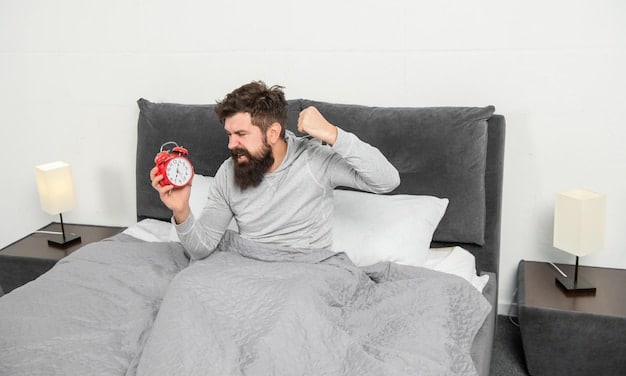Sleep Sabotage: Optimize Your Rest for Peak Performance

Anúncios
Is your sleep schedule sabotaging you? Discover how inconsistent sleep patterns, poor sleep hygiene, and underlying sleep disorders can negatively impact your health, performance, and overall well-being, and learn practical strategies to optimize your rest for peak performance.
Are you constantly tired, struggling with focus, or feeling run down? Your sleep schedule might be the culprit, relentlessly sabotaging your potential. This guide will help you unlock the secrets to optimizing your rest and achieving peak performance in all areas of your life.
Anúncios
Understanding the Sleep Schedule Sabotage
Many of us underestimate the significant impact our sleep schedule has on our overall health and well-being. An inconsistent or inadequate sleep pattern can lead to a cascade of negative effects that undermine our daily performance and long-term health. But how exactly does your sleep schedule turn into a source of sabotage?
The Circadian Rhythm Connection
Our bodies operate on an internal clock known as the circadian rhythm, a roughly 24-hour cycle that regulates various physiological processes, including sleep, hormone release, and body temperature. Disrupting this rhythm can throw your entire system off balance.
Anúncios
The Impact of Inconsistent Sleep
An inconsistent sleep schedule confuses your body’s internal clock. This confusion can manifest in several ways, from difficulty falling asleep and staying asleep to feeling groggy and unfocused during the day. Over time, chronic sleep deprivation and circadian rhythm disruption can lead to more serious health problems.
To further illustrate the point, let’s consider some key aspects affected by a sabotaged sleep schedule:
- Cognitive Function: Poor sleep impairs memory consolidation, attention span, and decision-making abilities.
- Physical Health: Chronic sleep deprivation increases the risk of cardiovascular disease, diabetes, and obesity.
- Mental Well-being: Sleep disturbances are closely linked to mood disorders, such as anxiety and depression.
In conclusion, a sabotaged sleep schedule has far-reaching consequences, impacting not only our ability to function optimally but also our long-term health and happiness.
Identifying the Culprits: What’s Wrecking Your Sleep?
Before you can fix a problem, you need to identify the cause. Several factors can contribute to a disrupted and sabotaging sleep schedule. Recognizing these culprits is the first step towards reclaiming control of your sleep.
Common Sleep Saboteurs
Numerous lifestyle habits and external factors can interfere with your body’s natural sleep-wake cycle. Here are some of the most common sleep saboteurs:
- Screen Time Before Bed: The blue light emitted from electronic devices suppresses melatonin production, making it harder to fall asleep.
- Caffeine and Alcohol Consumption: Caffeine is a stimulant that can keep you awake, while alcohol, although initially sedating, can disrupt sleep later in the night.
- Irregular Meal Times: Eating meals at inconsistent times can throw off your digestive system and interfere with your circadian rhythm.
Underlying Sleep Disorders
Sometimes, a disrupted sleep schedule is not just a matter of bad habits; it can be indicative of an underlying sleep disorder. Here are a few common sleep disorders that can wreak havoc on your sleep:
- Insomnia: Difficulty falling asleep or staying asleep, leading to daytime fatigue and impaired functioning.
- Sleep Apnea: Repeated pauses in breathing during sleep, often characterized by loud snoring and gasping for air.
- Restless Legs Syndrome (RLS): An irresistible urge to move the legs, often accompanied by uncomfortable sensations, which can disrupt sleep.
Identifying the specific factors that are sabotaging your sleep is crucial for developing an effective strategy to improve your sleep schedule and overall well-being.
Crafting Your Ideal Sleep Schedule: A Step-by-Step Guide
Now the real work starts. Designing a sleep schedule that actually works for you requires careful consideration of your individual needs, lifestyle, and potential obstacles. But don’t worry, this guide will walk you through the process, step by step.
Assess Your Current Sleep Habits
Start by tracking your current sleep patterns for a week or two. Note the times you go to bed, wake up, and any disturbances during the night. This information will provide valuable insights into your existing sleep habits and potential areas for improvement.
Determine Your Optimal Sleep Duration
Most adults need around 7-9 hours of sleep per night to function optimally. Experiment to find the sleep duration that leaves you feeling rested and energized. Keep in mind that individual needs may vary; some people may thrive on slightly less, while others may require more.
Establish a Consistent Bedtime and Wake-Up Time
Consistency is key when it comes to regulating your circadian rhythm. Choose a bedtime and wake-up time that align with your natural sleep tendencies and stick to them as closely as possible, even on weekends.
To summarize, designing an ideal sleep schedule involves careful planning and adherence. By assessing your current habits, determining your optimal sleep duration, and sticking to a consistent sleep-wake cycle, you can take control of your sleep and reap the benefits of restful nights.
Mastering Sleep Hygiene: Creating the Perfect Sleep Environment
Your sleep environment plays a crucial role in the quality of your rest. Creating an oasis conducive to sleep involves optimizing various factors, from room temperature to light exposure. Let’s explore how to master sleep hygiene for a more restorative slumber.
Optimal Room Conditions
Your bedroom should be a sanctuary designed for sleep. Here are some key elements to consider:
- Temperature: Keep your room cool, ideally between 60-67 degrees Fahrenheit (15-19 degrees Celsius).
- Darkness: Minimize light exposure by using blackout curtains or an eye mask.
- Quiet: Reduce noise levels with earplugs, a white noise machine, or a fan.
Pre-Sleep Routine Rituals
Establishing a relaxing pre-sleep routine can signal to your body that it’s time to wind down. Consider incorporating the following rituals into your evening routine:
- Limit Screen Time: Avoid electronic devices for at least an hour before bed.
- Take a Warm Bath or Shower: This can help relax your muscles and lower your body temperature.
- Read a Book or Listen to Calming Music: Engage in relaxing activities that promote relaxation.
In conclusion, mastering sleep hygiene involves creating an optimal sleep environment and establishing a relaxing pre-sleep routine. By optimizing these factors, you can pave the way for more restorative and rejuvenating sleep.
Nutrition and Exercise: Fueling Your Body for Better Sleep
What you eat and how you move your body can significantly impact your sleep quality. A balanced diet and regular exercise can contribute to a more consistent sleep schedule and improved overall well-being. Let’s explore how nutrition and exercise can fuel your body for better sleep.
The Power of a Balanced Diet
Your diet provides the building blocks for essential neurotransmitters involved in sleep regulation. Here are some key nutritional considerations:
- Limit Processed Foods and Sugary Drinks: These can cause blood sugar spikes and crashes that disrupt sleep.
- Incorporate Magnesium-Rich Foods: Magnesium promotes relaxation and supports healthy sleep patterns.
- Time Your Meals Wisely: Avoid eating large meals close to bedtime, as this can interfere with digestion and sleep.
The Benefits of Regular Exercise
Regular physical activity can improve sleep quality by reducing stress, promoting relaxation, and regulating your circadian rhythm. However, the timing of exercise is crucial.
- Avoid Intense Workouts Close to Bedtime: Strenuous exercise can be stimulating and make it harder to fall asleep.
- Aim for Moderate Exercise During the Day: This can help regulate your sleep-wake cycle and promote restful sleep.
In summary, nutrition and exercise are powerful tools for improving sleep quality. By adopting a balanced diet and engaging in regular physical activity, you can fuel your body for better sleep and overall well-being.
Navigating Challenges and Staying Consistent
Even with the best-laid plans, life can throw curveballs that disrupt your sleep schedule. Travel, work demands, and social events can all pose challenges to maintaining consistency. However, with a proactive approach and a commitment to your sleep goals, you can navigate these challenges and stay on track.
Strategies for Handling Travel and Jet Lag
Traveling across time zones can wreak havoc on your circadian rhythm, leading to jet lag. Here are some strategies for minimizing the effects of jet lag:
- Adjust Your Sleep Schedule Gradually: Start shifting your bedtime and wake-up time a few days before your trip.
- Expose Yourself to Sunlight: Sunlight helps reset your circadian rhythm.
- Stay Hydrated: Dehydration can worsen jet lag symptoms.
Managing Shift Work and Irregular Schedules
Shift work and irregular schedules can make it difficult to maintain a consistent sleep schedule. Here are some tips for managing these challenges:
Navigating challenges and staying consistent with your sleep schedule requires a proactive approach and a commitment to your sleep goals. By implementing these strategies, you can minimize disruptions and maintain a healthy sleep pattern.
To summarize, consistently prioritizing and defending your sleep schedule, even when life throws you curveballs, is essential for realizing the full benefits of optimized rest and peak performance.
Conclusion
By understanding the importance of a consistent sleep schedule, identifying the factors that sabotage your sleep, and implementing effective strategies for optimizing your rest, you can unlock numerous benefits for your health, performance, and overall happiness. Prioritize your sleep and commit to creating a sleep schedule that supports your well-being. Make sleep a non-negotiable part of your daily routine and reap the rewards of a well-rested life.
| Key Point | Brief Description |
|---|---|
| ⏰ Consistent Schedule | Maintain regular sleep and wake times, even on weekends. |
| 🌙 Sleep Hygiene | Optimize your sleep environment for darkness, coolness, and quiet. |
| 💪 Nutrition & Exercise | Balance diet and exercise, avoiding heavy meals and intense workouts before bed. |
| ✈️ Travel Strategies | Adjust sleep gradually before travel, expose yourself to sunlight, and stay hydrated when traveling. |
Frequently Asked Questions (FAQs)
▼
Most adults need 7-9 hours. However, individual needs very. Monitor how you feel; if alert and energetic during the day, you’re likely getting enough.
▼
Napping can be beneficial if done right – short (20-30 minutes) and not too late in the day. Avoid long or late-day naps that can disrupt nighttime sleep.
▼
Establish a consistent sleep schedule, optimize your bedroom environment, and practice relaxation techniques. If insomnia persists, consult a healthcare professional.
▼
A balanced diet is crucial. Limit processed food and caffeine and focus on magnesium-rich foods. Avoid alcohol and large meals close to bedtime and manage meal timings.
▼
Consistency helps regulate your body’s internal clock, making it easier to fall asleep and wake up at consistent times, leading to improved sleep quality and daytime functioning.
Conclusion
Optimizing your sleep schedule isn’t just about getting more hours in bed; it’s about strategically managing your rest to enhance overall well-being. Embrace consistency, prioritize sleep hygiene, and address underlying issues that may be sabotaging your sleep. With the right approach, you can transform your sleep schedule from a source of frustration into a powerful tool for peak performance.







